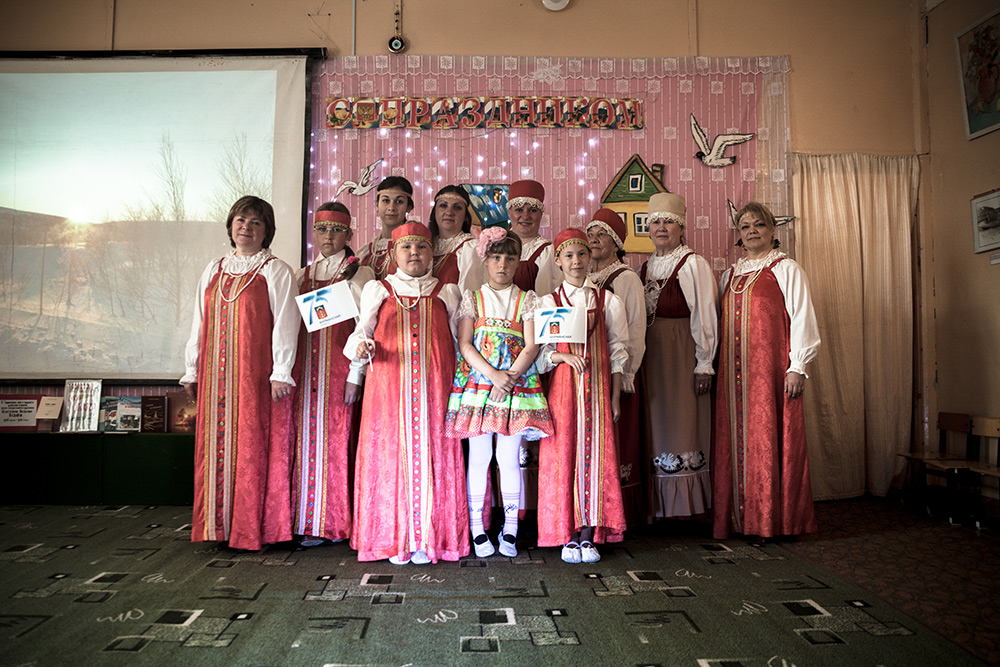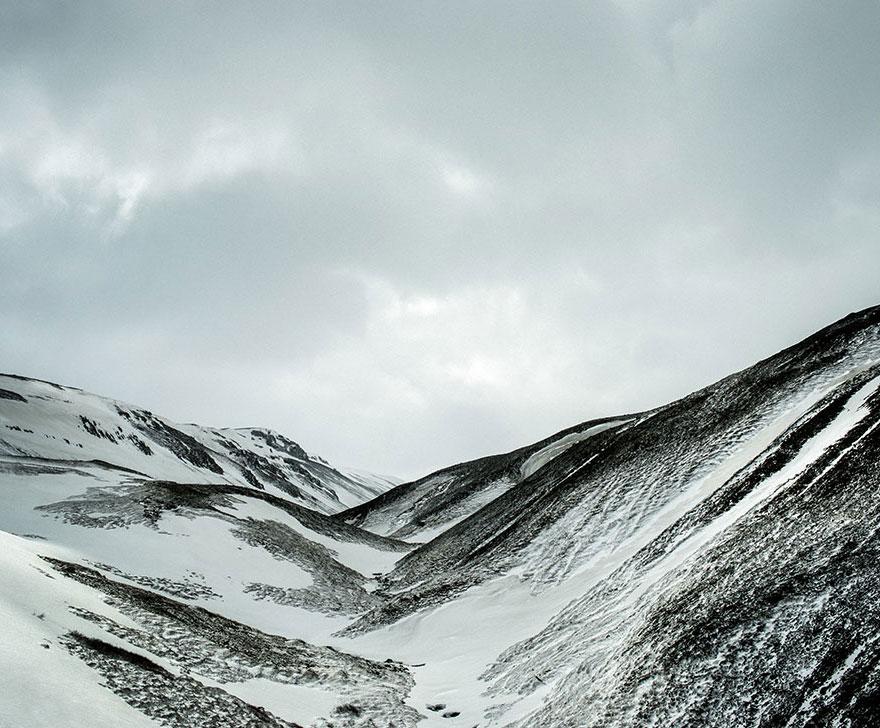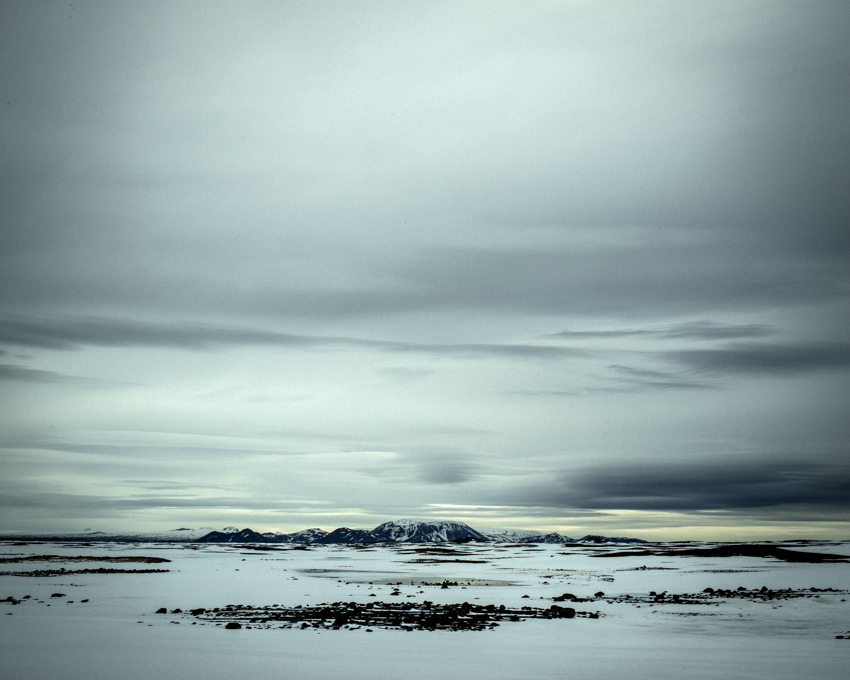
This article, in French, appeared in the print version of Le Monde. It is part five of a special six-part summer series. See the full multi-media feature online.
It's the same question every time. Not a hint of mistrust, just amazement. "What are you doing here?"
It's only been 30 years since the dirt road to Teriberka was built, before that people arrived by sea when the north wind, blowing in off the Arctic Ocean, was favorable.
Until 2008, Teriberka, located 150 kilometers from Murmansk in northeastern Russia, belonged to the prohibited zones so jealously guarded by the KGB. However, since Gazprom, the Russian energy giant, set its sights on this semi-derelict village on the edge of the Barents Sea almost ten years ago, people are more relaxed.
Gazprom intended to build a gas liquefaction plant here, to service the massive Shtokman gas field located 600 kilometers offshore. However, there has been a small holdup. This enormous project, which could transform Teriberka into an Eldorado, is frozen in place because of technical difficulties and excessive costs. Installation of the offshore platforms could also be in jeopardy, because global warming is causing cracks in the icepack and unleashing huge icebergs into the Arctic Ocean. For now, the promises made to the people of Teriberka are broken, perhaps for decades to come.
"What are you doing here? For Shtokman, right?"
Shtokman, a symbol of the big rush to claim rights to the Arctic's natural resources, has been making headlines for some time now. Yet the gas field and all the wealth it promises seem remote to the villagers of Teriberka. The town no longer boasts a café, and two-thirds of the buildings are unfit for habitation, their exteriors crumbling from the intensity of a brutal north wind. In this post-war landscape, the dirt roads are littered with Soviet-era car wrecks. Farther on, the hulks of old boats of the former fishing kolkhozy—the Soviet form of collective farming—rot away in the bay, looking like fishbones on a garbage heap.
Tatiana is the first to express her surprise to see us here. She runs a liquor store in the "new" Teriberka, former home to the shipyards, and also deteriorating like the "old" Teriberka with its beautiful sandy beaches and ramshackle houses.
"There aren't a lot of people left in town, so not many come here to drink," she says.
Tatiana Souslova was born in Teriberka 60 years ago. Her strategically placed shop has the only ATM in town.
"The young people only drink beer, that leaves the old folks to drink vodka," she adds. Her shop was renovated a year ago.
"In any case, it's been a long time since anything new was built here." Looking out the window, she adds, "a forgotten, isolated corner of the world."
The Teriberka administration gets its budgetary numbers from the Kola district authorities.
"We 're only responsible for the water, electricity, heating and garbage here," explains Nadje Riajskich. She is the caretaker of the Shtokman Development building, and tells us to contact the office in Murmansk for any further information. Everyone here knows that Teriberka's fate is not decided here in Teriberka.
All the same, the village has a grand history. Isolated at the outer reaches of the tundra, Teriberka has been inhabited for thousands of years. The local fishermen are called Pomors, descendants of a group of Russian settlers. During the '60s, when the shipyards were up and running, there were 12,000 people living here. After the fall of the Soviet Union and the shift to a market economy the town began to fail. All that remains are a thousand or so residents, numerous derelict buildings, promises from Gazprom, and the tremendous determination of the people who cling to this remote corner of the world.
Irina Nikolaeva, the librarian, came here as a child when her father wanted to return to the place of his birth. She remembers the first time Gazprom came to the village and disclosed its big plans. They thought a new road through town would to stir up enthusiasm among the residents. The outcry was immediate. The Gazprom engineers had put the road through the cemetery. When you understand what it takes to survive here, you respect the dead. Gazprom reviewed its conduct and in a show of generosity, promised to construct new houses and a cultural center, create jobs, pay for the childrens' education. A real bonanza was in the offing.
"Shtokman? I don't think much of it," is the resigned answer you will hear from the villagers today.
In the end, a couple of school rooms were renovated, and a handful of students received scholarships to study the oil and gas business at the Murmansk University. Irina's daughter was one of them. The library was partially refurbished, but few people bothered to make use of the facility. Irina once managed to entice an author to visit. He came here to pay tribute to Vladimir Smirnoff, a local poet who died some years ago. Smirnoff wrote poetry about Teriberka and also composed the village hymn. Irina reads a passage about "the Pomor Village" and one of its ancient traditions that is as sacred as the truth: when someone is setting off on a long journey, you wish them godspeed.
"May the wind help you on your way," wrote Smirnoff.
"May the wind be behind, may your boat sail toward the dawn."
The history of the Pomor settlers, and poetry are an important part of Olga Nikolaeva's life. The former professor of literature now leads the Pomor choir, the pride of Teriberka. Fifteen women, dressed in traditional costume, tour around the region singing folksongs about their village and their traditions.
Olga, a town council member for eight years, is one of Teriberka's matroyshkas, a respected Russian mother-figure.
"You know what, even if Shtokman doesn't happen, we'll still be here. Nothing else will come here to replace Shtokman, but we have survived without Shtokman, and we will continue to survive without Shtokman."
She moved here with her husband because of a housing issue.
"We said we would go to the ends of the Earth, but we never imagined this would really be at the end of the Earth," says Olga. "Still, we stayed."
Her husband died seven years ago.
"I don't want to leave." She looks out her window at the beauty of the midnight sun, at the view beyond the ramshackle houses, the flat-topped mountains, at nature and the big open spaces.
"I adore this place."
The fish processing plant that opened a few years back brings a ray of hope to the townspeople. The work is hard but the pay is good, based on village standards. Sadly they only hired about a hundred people.
The residents of Teriberka feel so far removed from the outside world, they are convinced that if the Shtokman project does get off the ground, it will be without them.
"No one here is educated," notes Olga. A lot of the men are unemployed, men who don't sing.
"The men are strange," she adds. "They drink, and when they're not drinking, they read, they go salmon and crab fishing, even when it's prohibited."
She knows what she's talking about. Her husband died of alcoholism, cirrhosis of the liver, a local specialty.
"He drank vodka, beer, wine."
She won't elaborate.
"In Teriberka. the women are responsible for everything. They run the village. Real Russian women, lrina points out, "who can stop a runaway horse or run into a burning izba."
Igor Saguitov, 21, is one of the few men who sings. He too received help from Gazprom to study the oil business in Murmansk, but he dropped out, preferring instead to become a sound engineer, an idea suggested by Olga.
"Since Sthokman isn't happening, I don't want to be shipped off to Kamtchayka, (in the far east of the country). I want to make my living right here."
His girlfriend Natacha, will learn hairdressing in Murmansk, and plans to find a job there too, since Teriberka doesn't have a hair salon. Nor is it easy to raise children here. This past winter there were problems, as always, with the electric power.
"It was three degrees Celsius in the apartment," Olga recalls. "We wore our fur hats and sang."
The health risks don't worry her as much.
"We have one doctor, but he is old, deaf and blind, so everyone is in good health," she jokes.
Valeri Chatchaturov, originally from the Black Sea region, is another man who doesn't sing. During his military service he got along well with the boys from Teriberka. So ten years ago, he left Abkhazia and moved here. Initially he worked as a fisherman, but quit a few years later when his boat sank. His official job since then, like most of the people here, is collecting berries and mushrooms. He gets by. He was arrested once when someone turned him in for fishing king crabs. The police came from Murmansk, but the charges were dropped for lack of evidence. Valeri shrugs. Part of an initiative he has launched for the upcoming local elections would allow residents to sell their fish. Presently, they are restricted by a lot of bureaucratic red tape.
"Sthokman and its promises, who cares?" says Valeri." All we ask for is the right to live our lives with what we have available here."
Researchers are predicting the migration of fish stocks from the Norwegian waters to the Russian side of the Barents Sea, as a result of global warming. The Teriberka villagers have trouble believing them. All that's left is the motto, in the guise of a promise, "May the wind be of help to you." Wherever it may come from.
Translation by Anne Thurow

Education Resource
Yves Eudes Discusses Climate Change in the Arctic
The impact of global warming is clear: icecaps are melting, glaciers are disappearing, fish...




